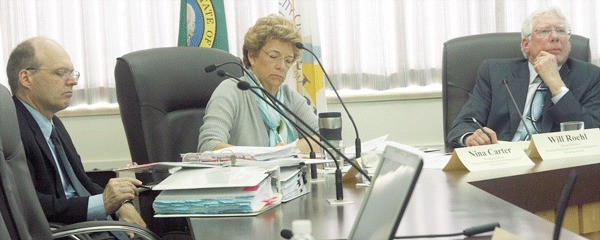Members of the Western Washington Growth Management Hearings Board seemed sympathetic to arguments by the Oak Harbor city attorney during a lengthy hearing Monday over an issue that could shape the city in years to come.
The board members sounded more skeptical, however, about City Attorney Margery Hite’s proposed solution.
The three-member board took over the Oak Harbor City Council chambers to hear the city’s petition for review of the Island County commissioners’ decision last year to limit the size of the urban growth area, or UGA, adjacent to the city’s boundaries.
About 30 people, including more than a dozen citizens, showed up for the hearing, which Hite described as being “of high interest in the community.”
The hearing pitted Hite against Island County Deputy Attorney Dan Mitchell and Planning Director Bob Peterson. In addition, Steve Erickson of the Whidbey Environmental Action Network argued on the county’s side as an intervenor.
The argument is essentially over the city’s boundaries. The city planners decided that the UGA should grow by 180 acres to accommodate 126 percent of the expected population growth over 20 years. An urban growth area is the land outside of city limits designated for future annexation and development.
The city’s proposed UGA included 105 acres of the Fakkema Farm on the west side of the city. But last year the county commissioners, who are ultimately responsible for setting UGAs, denied all but an 18-acre commercial property, citing problems with the city’s housing analysis.
The issue is complicated by the fact that the county was six years later in making a decision on the city’s UGA. The former planning director and commissioners dropped the issue completely after disagreements arose between the city and county over how to handle the environmental impacts of an expanded UGA. The county commissioners, after being pressed by the city, finally made a decision last year, but it wasn’t what the city wanted.
In response, city officials filed a petition for review with 16 points of contention.
Monday, Hite argued her points before the hearings board. Ironically, she was formerly a member of the hearings board, which was pointed out during the hearing.
Hite criticized what she characterized as county officials’ lack of cooperation with the city and lack of a public process. She said county officials only gave one week’s notice that the issue was going to be on the commissioners’ agenda. The planning department’s recommendation was to deny the residential expansion because of flaws in the city’s housing analysis and a disagreement over whether the 126 percent “market factor” was appropriate.
“We submit that one week to present information about a market factor that had been approved, supported and recommended up to that point is really inadequate,” Hite said.
Hite said the county is required under the Growth Management Act to cooperate with the city in making the decision and to “attempt to come to an agreement”; in fact, she argued that county is required to give deference to the city. She said there was clearly no cooperation.
“Both the city and county were left out of the process,” she said.
Mitchell argued that county officials did in fact cooperate and communicate with city planners. He presented notes from meetings between the two planning directors at which they discussed the issue. Hearings board member Jim McNamara, however, seemed skeptical and grilled Mitchell about whether the county really tried to reach an agreement with the city.
Hite also was critical of the county’s planning policies, which she said plans for 70 percent of the county’s growth to occur in rural areas. She argued that policy is detrimental to the environment and encourages urban sprawl since the rural areas don’t have infrastructure necessary to cope with intense growth. The city, she pointed out, has to comply with tough standards in dealing with stormwater and sewage.
“It really flies in the face of the fundamentals of the Growth Management Act,” she said.
In his presentation, Mitchell focused on the fundamentals of the state’s Growth Management Act. He said growth isn’t supposed to exceed the state projections and a reasonable “market factor” or cushion to make up for the fact that not all land will be developed to its highest potential.
Peterson and Erickson discussed the city’s housing analysis, which they said showed there was already enough property available inside the city limits to handle 105 percent of growth over 20 years. They said the city double counted some people and ignored some properties that should have been counted, which means the city has much more land available than the analysis showed.
But again, Hite stressed that county officials should have discussed their concerns with the city instead of taking unilateral action.
The members of the hearings board, however, repeatedly questioned Hite about how the problems should be resolved. She replied that the county should reopen the lengthy process and work toward an agreement.
Hearings Board member Will Roehl pointed out that the update to the county’s comprehensive plan, with the UGA update, must be completed in 2016. Peterson said the county is already in the process of beginning the update process. That means county officials will take another look at UGA boundaries in the next couple of years, regardless of the decision by the Western Washington Growth Management Hearings Board.
The written decision by the hearings board is due Dec 12.



